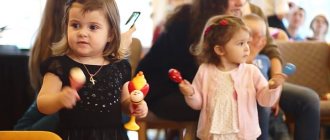Save article:
The article explains:
- The importance of early career guidance in preschool children
- Visual aids for career guidance for young children
- 5 interesting techniques for early career guidance for children
- Advice for parents on career guidance for young children
Career guidance for young children fosters a positive attitude towards work and allows them to try their hand at different types of activities.
The more a child knows about professions, the more clear the importance of work will be for them. The success of early career guidance depends on the fact that already in preschool age a sincere interest in the adult world appears. As a result of career guidance, children begin to become more interested in the activities of their own parents, and dynasties of doctors, teachers and engineers appear. Read more about what career guidance is for young children in our material.
The importance of early career guidance in preschool children
The first look at work and labor is very important for a child, because it significantly influences his understanding of the significance of the role of different professions in society.
The importance of early career guidance in preschool children
The whole world, society and, accordingly, the labor market are rapidly developing and changing. Of course, it is now unknown what will happen in ten years and what professions will be relevant and in demand. However, it is obvious that in such a dynamically changing world, a person’s flexibility, his ability to change the direction of career development and learn new things will be valued so that he can succeed in different areas and be realized in many of his endeavors.
This means that for modern children the factor of cognitive activity becomes very important, which determines the vector of efforts in preschool education.
And this is not about adults choosing a profession instead of a child even in preschool age, of course, but about giving the child a choice. So, it all starts with the child becoming familiar with work and professions in general. Only after getting acquainted with any field of activity, the child already learns new things and broadens his horizons. And the more such knowledge and skills he has, the easier it will be for him at a conscious age to choose a profession based on his skills and preferences.
Just as in the initial stages of career guidance, children are helped by their teachers, so they themselves become familiar with work through training sessions and various games.
Parents, of course, also actively participate in the development of their own children, helping teachers. By interacting with their parents, children learn new things, acquire norms of social behavior, improve communication and study skills, and, of course, get acquainted with work and various professions.
MAGAZINE Preschooler.RF
Innovative project “Early career guidance for preschool children”At the present stage, the education system is undergoing a process of modernization, taking into account current trends in state policy. Innovative processes in the education system require a new organization of the system as a whole. According to the Law of the Russian Federation “On Education in the Russian Federation” dated December 29, 2012 No. 273-FZ, Article 64 states that the process of preschool education “is aimed at the formation of a general culture, the development of physical, intellectual, aesthetic and personal qualities, the formation of prerequisites for educational activities , preserving and strengthening the health of preschool children . Particular importance is attached to preschool upbringing and education. In this regard, preschool educational institutions are tasked with using modern, effective and innovative means of child development. Innovative activities should be focused on improving the educational, methodological, personnel, organizational, material and technical support of preschool educational institutions, and the organization of social partnerships.
As a rule, career guidance begins only in the senior grades of secondary schools. The child does not have time to make an informed choice, since the list of proposed professions is small, knowledge about them is minimal and is given sporadically.
But hidden reserves of career guidance are hidden not only in the initial level of education, but also at the stage of preschool childhood. An early start in preparing a child to choose a future profession is not about imposing on the child what he should become, according to the parents (because, for example, many in the family work in this field), but about introducing the child to various types of work to make it easier for him to make independent choices in the future. As part of continuity in career guidance, kindergarten is the initial link in a single continuous education system. It is in kindergarten that children become acquainted with the diversity and wide choice of professions.
Depending on the abilities, psychological characteristics of temperament and character, on the upbringing of the child and instilling in him the value of work, children develop a system of knowledge about professions, interests and attitudes towards certain types of activities. In kindergarten, at this stage, it is necessary to create a certain visual basis, an environment on which the further development of professional self-awareness will subsequently be based.
The current situation has forced us to take a fresh look at the organization of career guidance work, which must begin now. The more diverse a preschooler’s ideas about the world of professions, the brighter and more attractive this world is for him. The basis of early career guidance is the formation in preschoolers of an emotional attitude towards the professional world, providing him with the opportunity to use his strengths in available activities. Forming preschoolers’ ideas about the world of work and professions is a necessary process that is relevant in the modern world. Therefore, there is a need for targeted work with children to develop knowledge about the work of adults and the professions of their parents.
1. 2. Regulatory support of the innovative project.
- Federal Law of the Russian Federation dated December 29, 2012 No. 273-FZ “On Education in the Russian Federation” ;
- Law of the Krasnodar Territory of July 16, 2013 No. 2770-KZ “On education in the Krasnodar Territory” ;
- Sanitary and epidemiological rules and regulations SanPiN 2.4. 1. 3049-13;
- Federal state educational standard for preschool education. Order of the Ministry of Education and Science of the Russian Federation of October 17, 2013 N 1155;
- Charter of the municipal budgetary preschool educational institution - kindergarten No. 11 of the village.
1. 3. Problem solved in the course of innovation activity. The degree of theoretical and practical elaboration of the problem.
Problem: Lack of awareness among children about the variety of professions.
2. Purpose. Object of innovation activity. Subject of innovation activity. Hypothesis. Tasks.
Goal: - To create a certain visual basis, the environment on which the further development of professional self-knowledge will be based in the future.
Tasks:
- Create in the educational institution the material and technical conditions necessary for the implementation of the project (creation of a mobile RPPS);
- To increase the professional level of teachers and develop the ability to organize joint group activities using various methodological techniques and means, knowledge and mastery of modern technologies for the socialization of preschoolers, finding and using new educational resources that facilitate solving the goals and objectives of early vocational guidance for preschoolers, the ability to create their own didactic and developmental materials;
- To increase the pedagogical competence of parents as part of joint work on the implementation of the Project: “Early career guidance for preschool children” ;
- Develop methodological recommendations, a series of practical activities to improve the social and communicative competence of preschool children
- Organize: excursions, meetings, as well as close interaction with parents;
For children
- To form in children generalized ideas about the structure of the labor process, the role of modern technology in human labor activity, an understanding of the relationship between the components of labor activity;
- Foster a caring attitude towards work and its results;
- Help children understand the importance, necessity and indispensability of each profession;
- To develop the ability to reflect one’s impressions and knowledge in playful and productive activities;
- Stimulate the development of children's cognitive, communicative, and creative abilities.
- Enrich RPPS (role-playing games, didactic games, book material, albums on a specific profession, etc.) with special equipment and game material in accordance with their professional direction;
For teachers
- Create and test virtual didactic products (virtual excursions, videos, presentations, games) for study in mobile interactive workshops;
- To develop methodological support for early career guidance for preschool children in the world of professions;
- Develop joint work with parents to expand children’s knowledge;
For parents
- Promote interest in excursions conducted for children;
- Accompany parents when providing their child with qualified assistance in the complex process of entering the world of the profession.
- Encourage active participation in the life of the preschool institution and in organizing excursions.
For social partners
- Create conditions and expressions of interest in strengthening partnerships;
The object is the process of work of a preschool institution on early career guidance.
The subject is the formation of a visual basis surrounding the environment of a preschool educational institution for early career guidance.
Research hypothesis: Creating a visual basis, the environment of a preschool educational institution is a necessary condition for a comprehensive system of immersing a child in the world of the profession and creates conditions for more effective social and communicative development of the child.
3. Theoretical and methodological foundations of the project (scientific and pedagogical principles, approaches, concepts underlying the project).
Kindergarten is the first important stage in preschoolers’ acquaintance with professions, which not only expands children’s general awareness of the world around them and their horizons, but also forms in them a certain basic experience and promotes early professional orientation.
The problem of introducing preschoolers to work has found a worthy place in the works of outstanding teachers of the past. K.D. Ushinsky considered labor as the highest form of human activity, in which the innate human desire to be and live is realized. The main tasks of education in work and for work K.D. Ushinsky believed in instilling in children respect and love of work along with the habit of working. To foster a respectful attitude towards work, it is necessary to develop in children a serious view of life and work as the basis. In the history of the development of pedagogical thought, approaches to solving the problem of introducing preschoolers to work have changed with the development of views on the personality of a child - a preschooler. A. S. Makarenko noted that proper education is necessarily labor education, since work has always been the basis of life. In modern pedagogical science, the problem of introducing preschoolers to the work of adults has been studied by many scientists: Krulekht M.V., Loginova V.I. Meged, V.V. Misharina, L.A., Ovcharov A.A. Shakhmanova A.Sh. There are different approaches to the issue of introducing preschoolers to the professions of adults. S.A. Kozlova and A.Sh. Shakhmanova suggest introducing children to workers, their attitude to work, and forming the idea that professions appeared in response to people’s needs (you need to carry a load, prepare lunch). M.V. Krulekht and V.I. Loginova focus on the formation of ideas about the content of labor, about the products of the activities of people of various professions, and on instilling respect for work. Many teachers, such as N.E. Veraksa and T.S. Komarov, recommend introducing children to the types of labor that are most common in a particular area. T.I. Babaeva and A.G. It is recommended to introduce Gigoberidze not only to the profession, but also to the personal qualities of representatives of these professions. Gradually introduce children into the world of economic relations, formulate reasonable needs in children based on the relationship between the desires and capabilities of the family. Develop a value-based attitude towards work. These tasks are reflected in the educational field “Social and communicative development” . Today, the main directions of child development have been identified, in which educational areas have been identified.
Early career guidance is predominantly informational in nature (general
acquaintance with the world of professions), and also does not exclude a joint discussion of the child’s dreams and experience acquired in some types of work activity (in terms of self-service, when performing feasible work).
Thus, the formation of preschoolers’ ideas about the world of work and professions is a relevant process in the modern world, which must be built taking into account modern educational technologies:
- Technology of project activities (L. S. Kiseleva, T. A. Danilina, T. S. Lagoda, M. B. Zuikova). Project activity is an activity with a specific purpose, according to a specific plan, to solve search, research, and practical problems in any area of educational content.
- Pedagogical technology for organizing role-playing games (D.B. Elkonin, A.V. Zaporozhets, R.I. Zhukovskaya, A.P. Usova, N.Ya. Mikhailenko). A game is the freest, most natural form of immersion in real (or imaginary) reality with the purpose of studying it, expressing one’s own “I” , creativity, activity, independence, and self-realization.
- The technology of integrated learning (L.A. Wenger, E.E. Kravtsova, O.A. Skorolupova) is a kind of innovative for preschool institutions. Integration is a state (or a process leading to such a state) of connectedness, interpenetration and interaction of individual educational areas of the content of preschool education, ensuring integrity. Based on the analysis of the studies studied and taking into account modern educational technologies, it is possible to determine the purpose and objectives of the work on early career guidance for children.
- Information and communication technologies. In modern conditions, development
human development is impossible without building a system for shaping his health. In a preschool institution at the moment these are: computers, multimedia projectors, laptops, televisions, as well as printers, a scanner, tape recorders, a camera, a video camera.
The information and communication technologies used can be divided into:
- multimedia presentations;
- virtual excursions (to enterprises, with representatives of professions, which are introduced to preschoolers).
Multimedia presentations are visual, allowing the teacher to build an explanation using video fragments.
The innovative project presents a systematic approach to career guidance for preschoolers. These theoretical conclusions, didactic and methodological materials in practical activities can be used in the development of career guidance programs for preschool children.
Studying the characteristics of various professions will be through the technique of “immersion in the profession ,” visiting workplaces, viewing visual information about professional activities, and meeting with professionals. It is quite logical that this system must be based on play activity as the leading one at this age stage, and create certain conditions for the development of play activity.
To implement the assigned tasks, social partners were involved and cooperation agreements were concluded with them. We believe that the development of social connections between a preschool educational institution and organizations provides an additional impetus for the spiritual and moral development and enrichment of the child’s personality, and improves constructive relationships with parents, built on the idea of social partnership.
4. Justification of the idea of innovation and the mechanism for implementing the innovation project.
The main idea of the innovative project: Creation of a single developmental space in a preschool institution to familiarize children with professions that are relevant for our village. Since the village is considered small and remote. Most of the population is employed outside the village. For this purpose, the united work of the entire teaching staff is directed towards early career guidance activities. For this purpose, a mobile RPPS is being created that satisfies the educational needs for the development of early career guidance both in groups and in preschool educational institutions with in-depth study of a specific profession.
According to the age characteristics of children, workshops are designated in the preschool educational institution, where the child can exercise himself in the ability to observe, remember, compare, act and achieve his goal in his independence and self-activity. The workshop is a special RPPS taking into account the specifics of each profession and creates the conditions for the game plot. The workshop intends to introduce children to a variety of professions and imagine what the professions of the future might be.
Workshop “Builders” - presented with construction kits, non-traditional materials, and small toys for playing with. Includes all construction professions: architect, bulldozer operator, crane operator, mason, carpenter, plasterer, roofer, etc.
“World on the Roads” workshop is represented by play centers, a stand in the kindergarten lobby, an area with traffic signs, and road markings. Includes drivers of all types of transport, traffic police service, road repair professions, auto mechanics, etc.
The Rescue Service workshop is represented by the Young Firefighter Center, the Ministry of Emergency Situations, medical workers, etc. game centers in groups.
Farming Workshop includes group play centers. An important component is the labor activity of children in the gardens on the kindergarten window. Game activities are built taking into account the traditions of people living in Russia and Kuban. Includes professions: agronomist, gardener, farmer, livestock specialist, poultry farmer, vegetable grower, etc.
A teacher is responsible for each workshop, who equips the RPPS with special play equipment, replenishes it with teaching aids, children's literature, art materials, etc.
It should be taken into account that an important role in the process of socialization is played by the interaction of a person with organizations, both specially created and those implementing a socializing function in parallel with their main functions (educational institutions). Here there is an increasing accumulation by the child of relevant knowledge and experience of socially approved behavior, as well as experience of imitation of such behavior and conflict or conflict-free avoidance of fulfilling social norms. Therefore, it is so important to organize psychological and pedagogical conditions in which the child reveals himself as a bright individuality, conveys his vision of the world, enters into social relationships, realizing his value and uniqueness.
Socialization, as a complex process, is carried out at three levels:
- communication with peers, which presupposes the ability to cooperate, effectively resolve conflicts, collaborate, etc.;
- at the level of everyday norms and rules of cultural behavior, i.e. rules of etiquette;
- introduction to life in society, which in preschool age is realized through familiarity with various social roles.
We have developed a system for visiting organizations. During the excursion, children not only form a knowledge system, but also acquire a socio-emotional means of familiarizing themselves with the world of adults, and children gain experience communicating with people. Children get the opportunity to expand and clarify knowledge about professions and enrich their vocabulary.
| Next > |
Visual aids for career guidance for young children
In the process of teaching children in general and in career guidance in particular, the factor of visibility is very important. Children learn any information better if you give a good example and clearly show them an illustration. Technical means help in this - from projectors to ordinary computers - and “classical” school tools: presentations, books and others.
Free online intensive
Your Path to IT starts here
More details
If you work well on the element of clarity and present children with relevant and correctly illustrated examples, you can really increase the effectiveness of training and career guidance. This makes it easier for children to be involved in the process, and they themselves better assimilate information, and their knowledge is not mixed into a single stream, but systematized.
- Technical equipment. The most common technical means used for preschool children are:
- Projector.
TV or computer monitor.
- Interactive board.
The interactive whiteboard allows you to present presentations, videos and various illustrations to children. Moreover, children can interact with various slides and animations - move objects, draw different shapes, flip through the slides. This way, the information that needs to be conveyed to children can be made not only more visual, but also more colorful, it is more memorable, because the children themselves are directly involved in the educational process. Moreover, this way you can involve the whole group, and not just the most active children, because it is similar to the format of the game and is interesting for all children.
Using a projector, children can be shown presentations and videos that will detail all the nuances of any profession. For example, a wide variety of slides or an interesting video will help children clearly see what the teachers are talking about.
On a TV or monitor, children can watch videos, films and cartoons that tell them about professions. More and more of these are produced every year, and many consider the career guidance cartoon “Kaleidoscope of Professions” to be one of the best. It is important to remember that after watching it, you must communicate with the children to find out how they understood the material, answer their questions, and thus better consolidate new knowledge.
Times change
With each passing decade, competition in the market gets tougher. According to Millennial Branding and Randstad US, Generation Z, born in the mid-90s in the West and early 2000s in Russia, is more conscious and goal-oriented about future work than their predecessors, Generation Y in the early 80s. 17% of them aspire to start their own business, this figure is 55% more than among generation Y. But many parents continue to follow the old pattern, when the child is left to his own devices until high school, and then in the 9th or 10th grade he is suddenly demanded of professional self-determination. There are happy exceptions when a child realizes his calling early and then confidently develops in the chosen direction. But you can seriously hope for this no more than winning the lottery.



